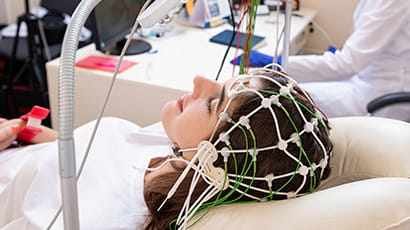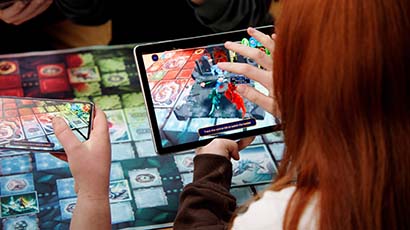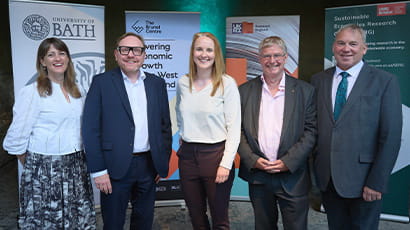Research to assess possibility of producing healthcare products like PPE at point of need

Medics attending an incident or humanitarian crisis could be one step closer to manufacturing personal protective equipment (PPE) and other critical healthcare products, thanks to research beginning next month. Led by the University of the West of England (UWE Bristol), the research programme will support feasibility studies and bring together experts to determine the technology, supply chain and training required for Redistributed Manufacturing (RDM) of a range of healthcare products and treatments.
RDM is defined as technology, systems and strategies that enable localised and customised healthcare manufacturing. RDM can deliver life-saving benefits in medical scenarios where there is urgent and unforeseen demand, such as in response to pandemics, natural disasters and emergencies.
For instance, in the case of a pandemic, RDM could help containment of outbreaks through speed of response and localised manufacturing of protective gear, pharmaceuticals and even vaccines close to the outbreak.
Wendy Phillips, who is a Professor of Innovation at UWE Bristol and is leading the project, said: “COVID-19 has highlighted the lack of resilience of large-scale global production and supply networks, emphasising the need for more coordinated, distributed, and responsive supply of goods, and the relocation of production of critical equipment such as regulation-compliant PPE closer to the point of need.
“The recent pandemic has provided even greater impetus for research into RDM, particularly with respect to its impact on complex supply chains, such as those that exist in healthcare.”
The two-year project begins in July and has received £2m funding from the Engineering and Physical Sciences Research Council (EPSRC). It will involve several virtual workshops, inviting experts from around the country in manufacturing, healthcare technologies, supply chain management and emergency medicine from the Universities of Loughborough, UCL, Cranfield, Sussex, Newcastle, KCL, Herriot Watt and UWE Bristol. Together they make up the Redistributed Manufacturing in Healthcare Network (RiHN).
They will discuss the challenges around RDM and will work with the Royal Centre for Defence Medicine to consider what is required for a system to deliver cost-effective, ‘right-first-time’ treatments close to the point-of-need.
Professor Phillips said: “When humanitarian, environmental or terrorist crises occur, the first hours are critical for saving lives or improving patient outcome - this new model of manufacturing could enable rapid diagnosis, production and testing in remote and changeable conditions.
“This project will enable us to identify which technologies have the most potential and which can be used in the field first. We will also look at how new processes will best fit together, as well as looking at the regulatory environment and what policy changes might be needed.”
RiHN is the first dedicated study of RDM in healthcare and the findings from its previous research have been of particular value to policy-makers and funders looking to specify action and to direct attention where it is needed.
This work could help pave the way for a future in which innovative manufacturing technologies such as 3D printing and advanced robotics are part of our everyday lives. For instance, we may be able to make medical products in our home, or print-on-demand personalised medicines at the supermarket while we shop. Bespoke devices such as prosthetics and orthotics could even be ordered online and delivered to our door the next day.
Related news

12 December 2025
UWE Bristol’s environmentally conscious and student-focused accommodation wins three awards
Purdown View, the world's largest certified Passivhaus student accommodation development, has been recognised at Property Week Student Accommodation Awards.

25 November 2025
Health-tech start up MyCelsius launches breakthrough cooling tech for hot flushes developed at UWE Bristol’s Launch Space
A pioneering Bristol-based health-tech company developing cutting-edge cooling technology for hot flushes has credited UWE Bristol’s Launch Space incubator with playing a key role in accelerating its product development.

14 November 2025
Lecturer wins prestigious Times Higher Education award for innovation in teaching
A senior paramedic science lecturer at UWE Bristol has been named the most innovative teacher of the year in the Times Higher Education Awards 2025.

13 November 2025
Alliance Medical and UWE Bristol launch UK’s first PET-CT postgraduate certificate
In a move set to transform imaging education, Alliance Medical (AML) and UWE Bristol have joined forces to co-design and develop the UK’s first PET-CT Postgraduate Certificate (PG Cert).

13 November 2025
New AI research to revolutionise animal welfare
A UWE Bristol research project will combine behavioural science and AI to create technology that understands not only what animals do, but how they feel.

29 October 2025
UWE Bristol academic unveils breakthrough in energy-efficient AI at NATO science forum
Dr Jonathan Lancelot has developed a new form of AI that could transform how intelligent machines operate in space, defence, and remote environments.

07 October 2025
Academic playing role in project to find hidden graves in Mexico using drone technology
A UWE Bristol lecturer is playing a part in a project using drone technology to locate concealed graves in Mexico.

01 October 2025
New funding for researchers to develop trustworthy clinical AI for assessing brain activity
Researchers have received funding from UK Research and Innovation to help bring their innovative brain-monitoring AI technology closer to real-world use.

11 September 2025
New study to investigate augmented reality as an intervention for emotionally based school avoidance
A UWE Bristol researcher will support a new study exploring whether an augmented reality board game can help young people with emotionally based school avoidance (EBSA).

22 August 2025
A decade of Future Space: How UWE Bristol’s enterprise zone is powering innovation and economic growth
Tracey John, Director of Research and External Engagement, reflects on the impact of Future Space and its role as a launchpad for cutting-edge companies shaping the future of how we live and work.

11 July 2025
Wound dressings developed with support from UWE Bristol to be launched by global firm
Technology that a team of UWE Bristol scientists helped develop to aid the healing of chronic wounds will be used in new ‘smart dressings’ being launched by global medical company.

03 July 2025
Research lab The Brunel Centre opens to power sustainable and inclusive growth for the West of England
A new data and research centre designed to support sustainable and inclusive growth and industrial strategy in the region, has officially launched.






